5kw Solar System Cost Guide
5kWh solar setups have become the top choice for installations throughout Australia, perfectly matching the needs of a typical family of 3 to 4 members [1]. Their popularity stems from their superb capacity to generate a considerable quantity of energy, coupled with their outstanding cost-effectiveness.
A 5kWh solar panel system will cost you between $5,719 and $6,309 installed [2–3]. The average price for a 5kw system in 2024 is $5,975.
This is the price after the solar rebate has been applied. Rebates are claimed by your installer so this is the final amount you will need to pay. You will not need to chase the government for a rebate, it’s already priced in.
| 5kW Solar System | Price |
|---|---|
| National Average | $5,975 |
| Low Estimate | $5,719 |
| High Estimate | $6,309 |
Table of Contents
ToggleRebate amount on 5kW system
The government solar rebate varies by the state you live in. For a 5kW system in NSW, QLD, SA and WA you will get a $1,886 rebate. For VIC and TAS, the rebate is $1,611.
This is not a fixed price and will go up or down by about 5% depending on the current price of STC’s.
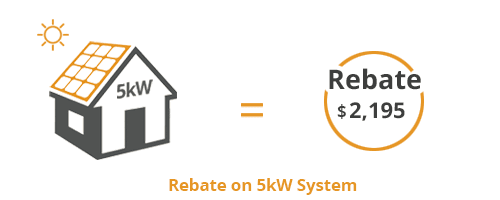
5kW Solar System Price by State
| Task | Avg. Cost | % + / - Average |
|---|---|---|
| New South Wales | $6,034 | -4.56% |
| Victoria | $6,309 | 6.3% |
| Queensland | $5,719 | 6.79% |
| South Australia | $6,034 | 1.26% |
| Western Australia | $6,034 | -12.72% |
| Aust. Capital Territory | $6,034 | -2.20% |
Australian Average | $5,975 |
|
As you can see, prices do vary depending on where you live in Australia and mostly due to the government rebates being more generous in some states. As you can see Western Australia is a full 12.72% less than the rest of the country on average.
A 5kW system in Queensland will cost the most being 6.79% above the average.
How much money can I save per year?
Once installed you can enjoy an average yearly saving of $1,947 per year on a 5kWh solar system. That works out to be about $162,75 per month.
The average homeowner can save between $20,000 and $96,000 over a solar panel system’s lifetime, depending on the electricity costs in your area [4].
This will vary from state to state depending on the max output of your system based on light levels, orientation and output.
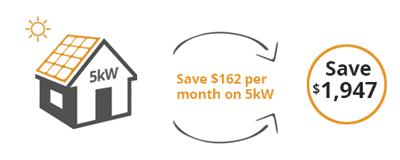
Whats the average payback period?
As per the Solar Choice Price Index, the typical expense for a 5kW solar system in Australia, as of July 2023, stands at approximately $1.13 per watt, equating to around $5,640 [5], and the yearly saving is $1,947.
Now a days, the payback period will be approx. 3-4 years [2][3][6].
Again this time will depend on the price you pay to install, your average yearly bill and the performance of your system month to month.
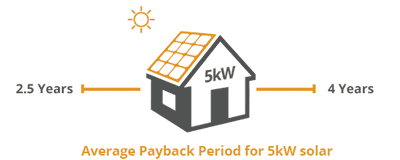
Power a 5kW solar system produce per day
This actually depends on a number of factors such as time of year, local weather and a lot of other factors. In most cases, the energy production of a 5 KW solar system ranges from 15 kWh to 22.5 kWh daily [7]. But mostly, typical 5kw solar system will produce about 20kWh of energy in one day [8][9].
Most of the energy is produced during a 4 – 5 hour window when the sun is at peak hours. This is due to the fact that, at this time panels are getting maximum light exposure.
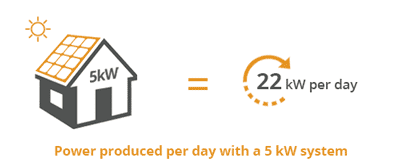
Average solar panel output = 320 watts
There are quite a few things that can affect how much power your 5 kW solar system produces in a day so we have written a whole article on just that topic.
In the above graph, a visual representation illustrates the power output of solar panels throughout a standard day. Initial power generation commences shortly after sunrise, with a gradual increase. However, the substantive surge in energy production is notably observed during the hours spanning from 10 am to 2 pm.
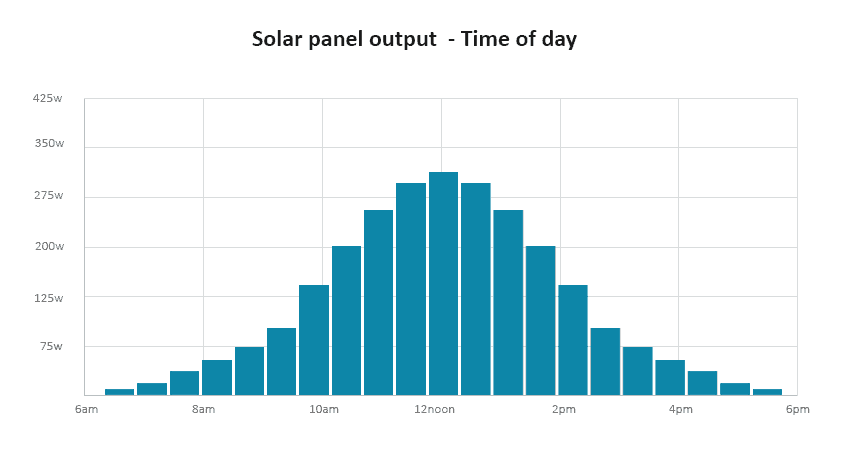
How much does it cost to install a 5kW solar system?
The price of the installation of a 5 kW system is included in the price of their quoted price for a 5 kW solar system.
Depending on the state you live in and the rebate you enjoy you can expect to pay about $5,975 Installed and after rebate.
It will depend however on the solar installation company you use. Every company uses different quality panels at different price points and add their own markup. Make sure you shop around before committing.
How many solar panels for a 5kWh solar system?
Each solar panel will produce 320 Watts of power at its peak. So to make 5,000 Watts per hour or 5kWh (kiloWatts per hour) you will need 16 panels.
5000 watts / 320 watts per panel = 16 Panels
Each panel is 1 X 1.6m in size. Refer to the image below for scale comparison.
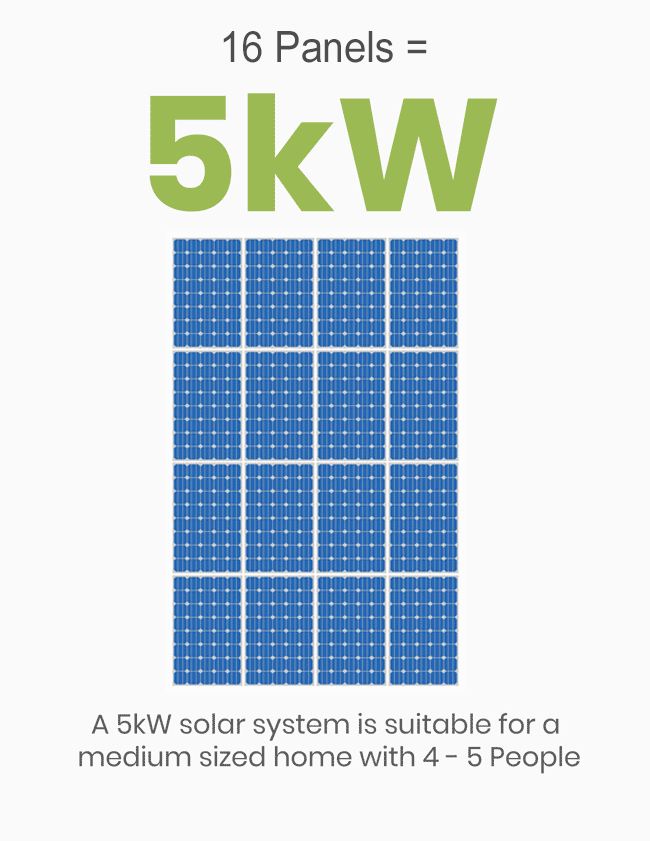
What can I run with a 5 kW solar system?
A 5 kW solar system is designed for a medium-sized home with 3-4 people living in it. This would cover you for all your basic essential appliances such as your refrigerator, hot water and Wi-Fi, as well as other items you use at peak times such as a dishwasher, washing machine, toaster, TV etc.
Your panels will only be useful to you during the day when they are generating electricity. Most households use most of their electricity at night, so it is worth considering installing a solar battery for your 5kW system to save power generated throughout the day for use later in the evening.
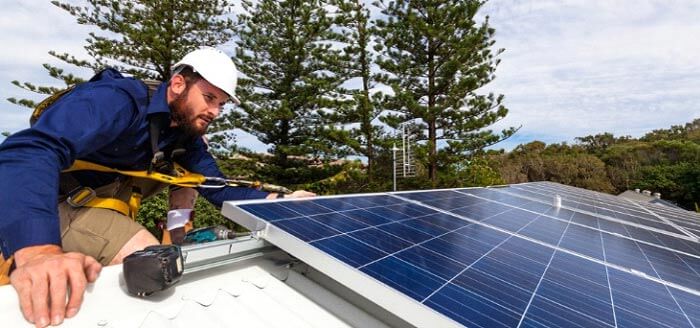
5 kW solar system key numbers
| Description | Key numbers |
|---|---|
| Number of panels | 15 – 20 |
| System cost including install | $5,000 – $7,000 |
| Payback period | 4-5 years |
| Potential yearly savings | $1,247 |
| Suits home size | Medium 3 – 5 people |
Is a 5kW solar system worth installing?
If you live in a medium-sized home with 3-4 people then the answer is an enthusiastic yes! With the rising cost of electricity in Australia and no signs of it getting any cheaper, the price local solar installers able to charge with the help of government rebates means you will have it fully paid off in just 3-4 years and will enjoy up to 80% off your power bill for your troubles for the following 25 years minimum.
I would say it is only worth it if you plan on living in your current location for more than 10 years.
Most popular solar panels being used in 5 kW systems
We have no affiliation with the below companies and are showing these panels based on their high quality and watt STC indicated by the companies themselves.
| Brand | Manufactured in | Model | Output (Watts STC) | Efficiency | Ultimate Performance Guarantee |
|---|---|---|---|---|---|
| Aleo | Germany | X59 300-315W | 315 W | 80% in the 25th year | |
| Sunpower | Philippines | SPR-X21-345 | 335 W | 21% | 92% in the 25th year |
| LG Solar | South Korea | High NeON R | 365 W | 21.4% | 88% in the 25th year |
| Panasonic | Indonesia | N330 HIT | 330 W | 21.6% | 86% in the 25th year |
| Trina | China | Tallmax M Plus | 335 W | 17.3% | 80% in the 25th year |
| Sunpreme | China | GxB 380 SM | 380 W | 22.5% | 85% in the 30th year |
| Canadian Solar | China | CS 6K-300MS | 300W | 18.3% | 80% in the 25th year |
| Jinko | Japan | JKM360M-72 | 340W | 18.5% | 80% in the 25th year |
FAQs
Will a 5kW solar system run a house?
A 5kW solar panel will produce 20kW of power per day on average. This will cover the power consumption needs of the average Australian household depending obviously on how big the house is and what appliances are running. But for an average home, 20kW of power would be sufficient. So, a 5kW solar system may meet the energy needs of an average household. However, in winter when a 5kW solar power system may not produce more than 15kW per day, there may be a shortage of power to run the house. Again this is dependent on your location and light during cooler months.
What are the 2 main disadvantages of solar energy?
a. Cost: The cost of solar panels is prohibitively high which takes at least 3 to 4 years of continuous use to recoup the investment. For example, the cost of a 5kW solar system could range from $4,500.
b. Uses a lot of space: Solar panel installations use up a lot of space on the roof. Even inside the homes, PV inverters take up a sizeable space.
Can I get solar panels for free?
To make electricity universally accessible, the Australian government has many schemes on the state level such as the solar rebate and feed-in tariffs making them a lot more affordable and a much more handsome investment. You can check with relevant state government initiatives to find out how much you can save on solar power. There are no free schemes in Developed nations like Australia.
How long do solar panels last?
Depending on the type of solar panels, they can last for 25 to 40 years. Usually, photovoltaic solar panels are under warranty for 25 years. Similarly, crystalline panels have a guarantee period of 20 to 25 years. All of these solar panels continue to work even after their warranty period is over. Some studies suggest that solar panels lose their efficacy by 0.5% to 1% every year. The installation of solar panels is an expensive exercise. However, if you live in the same house for long enough, the investments are recouped in 3 – 5 years.
How many solar panels does it take to run a house?
The number of solar panels you need will depend on the size system you need. The average-sized home with two bedrooms and 3.5 people need a 5kWh system which has 16 panels. An easy way to work it out is each solar panel generates 315W of power. Take the size of your system, let’s use a 4kwh system for an example. 4000w / 315w per panel = 13 Panels.
How many solar panels do I need for 20 kWh per day?
For 20kWh per day, you will require a minimum of 5kW solar system which by exploiting solar energy for four hours can produce 20kWh electricity. But with a 5kWh solar power system, you may not get 2okW power every day, especially during cloudy and rainy days when the production may slump to 10kW per day or even less. However, the same set-up may produce up to 30kWh of power every day during the sunny days of summer. However, the average electricity generation from a 5kW solar system over one year would be around 20kWh.
Is it harder to sell a house with solar panels?
No. Rather, it is easier to sell a house if it has solar panels. As per a nationwide survey, the resale value of a home increased by an average $4 for each watt of solar panel installed. By this estimate, a 5kW solar system would increase the value of the house by $20,000. Other surveys in this category revealed that homes with solar power installations sell faster than homes without them or those consuming a lot of energy. Also, the government agencies or municipalities do not levy additional property taxes even though the value of the home is increased due to solar power installations.
Are solar panels worth it in Australia?
Solar panels are becoming increasingly popular in Australia where the sun is abundant for most of the year. The government has been offering a high rate of incentives when solar installations were expensive. Now, there is relative stability both in the solar panel installations as well as a government incentive. Aussies seem to be enjoying the use of direct solar energy as much as possible. Self-consuming solar power helps the consumers to stop using high-tariff grid electricity. Last year, as many as 300,000 Aussie homes acquired solar power systems even though the upfront government incentive is no longer available in the same measure as before.
What is the best solar inverter in Australia?
1. SMA
SMA inverters are made of high-quality technology that is reliable with a proven track record. It’s a market leader in the solar power energy sector. It requires less maintenance and servicing.
2. Fronius
Beginning as a manufacturer of battery chargers, Fronius has been making PV inverters since 1995. Over the years, it has turned into a powerhouse of sustainable technologies and solutions besides making Fronius a trusted OV inverter band in the country.
3. SolarEdge
Though recently incepted, SolarEdge’s PV inverters are now providing solar energy in thousands of homes in about 100 countries. SolarEdge is an Israeli company with production facilities in Canada and China. SolarEdge is very popular in the Australian market as well.
Do solar panels cause cancer?
The photovoltaic system used in solar power generation emits electromagnetic (EM) fields, but these fields are within the official limits. Solar panels generate direct current, and wires carrying DC power do not create EM fields like wires carrying AC do. EM radiation is not known to cause any adverse health effects. Solar panels used for power generation at homes use non-toxic technology.
- Jeff Sykes,( 2023), 5kW Solar Systems: Pricing, Output, and Returns, Accessed on: 4th Feb 2024, https://www.solarchoice.net.au/system-size/5kw-solar-system/
- Solar answered,(2024),5kW Solar System Pricing, Savings, Rebates, Accessed on: 4th Feb 2024, https://www.solaranswered.com.au/home-solar/5kw-solar-system/
- SOLARGAIN,(2023), What to consider when installing a 5 kw Solar Power System, Accessed on: 4th Feb 2024, https://www.solargain.com.au/installing-5-kw-solar-power-system
- Emily Walker & Alix Langone, (2023), Solar savings by state: How much will solar panels save you in 2023? Accessed on: 4th Feb 2024, https://www.energysage.com/solar/much-solar-panels-save/
- Jeff Sykes, (2023), 5kW Solar Systems: Pricing, Output, and Returns, Accessed on: 4th Feb 2024, https://www.solarchoice.net.au/system-size/5kw-solar-system/
- Tom Sedgwick, (2021), How much will a 5kW solar system save me?, Accessed on: 4th Feb 2024, https://1komma5grad.com/au/blog/how-much-will-a-5kw-solar-system-save-me
- Solairworld, (2023), How Much Power Does a 5 KW Solar System Produce?, Accessed on: 4th Feb 2024, https://solairworld.com/how-much-power-does-a-5-kw-solar-system-produce/#:~:text=In%20most%20cases%2C%20the%20energy,meet%20your%20daily%20power%20needs.
- Dejan Nikolic, (2023), Is a 5kW solar system able to power your house?, Accessed on: 4th Feb 2024, https://www.gosunny.com.au/blog/5kw-solar-system-able-to-power-your-house
- Solar power Australia, (2019), how much power should my solar system be producing?, Accessed on: 4th Feb 2024, https://www.solarpoweraustralia.com.au/solar-system-production
Compare Solar Panel Quotes
Table of Contents
Toggle









